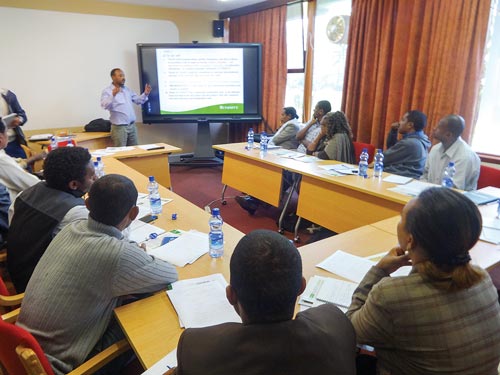CIMMYT’s Nutritious Maize for Ethiopia (NuME) project recently organized a half-day workshop to refresh the knowledge of financial officers from partner institutions on various accounting and reporting procedures, with specific reference to financial procedures that apply to projects funded by the Canadian Department of Foreign Affairs, Trade and Development (DFATD). Dr. Adefris Teklewold, NuME project leader, provided a detailed explanation of NuME objectives and its implementation to date.

The workshop was facilitated by Ato Antenane Abeiy, NuME project manager, and hosted some 20 finance and accounting professionals drawn from both governmental and non-governmental organizations directly involved in the implementation of the project. Participants included representatives of the Ethiopian Institute of Agricultural Research, the Ethiopian Ministry of Agriculture, Sasakawa Global 2000 and Farm Radio International.
Abeiy said that the workshop was organized to familiarize the participants with overall project financial management processes, as well as the requirements and procedures that apply both to CIMMYT and DFATD. The workshop clearly identified the challenges observed to date in NuME project fund administration processes and discussed possible solutions that will ease and speed up financial operations and systems for the remainder of the project.
Accordingly, discussions were held on topics including CIMMYT and donor requirements, NuME budget categories and budget lines, NuME cash transfer modalities, fund request and release procedures, implementation start-up, financial management and documentation, financial accountability, auditing and quality assurance and a summary checklist of required information and flow of activities developed to receive, disburse and report project-related funds.
Challenges and ‘common mistakes’ in financial management and reporting observed to date were discussed. These include: delays in signing sub-grant agreements; delays in fund release; underutilization of funds; under-reporting of expenditures; delays in reporting and reporting without following formal channels; filing reports without official approval; and reporting in lump sums with no detailed expenditure and description of expenditures attached.
Participants noted during the discussions that they will use the skills gained from the workshop to properly expedite and administer project funds and ease matters for their institutions and staff to properly implement the various activities planned for the effective implementation of the NuME project.
NuME is implemented by CIMMYT in Ethiopia and funded by DFATD. It is designed to help improve the food and nutritional security of Ethiopia’s rural population – especially women and children – through the adoption of quality protein maize varieties and crop management practices that increase farm productivity.
 Capacity development
Capacity development 
